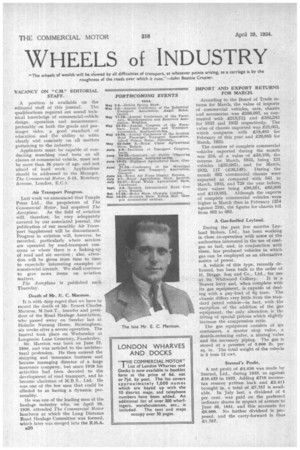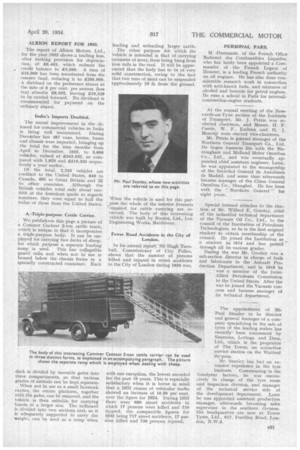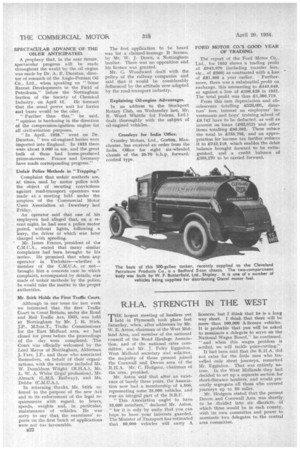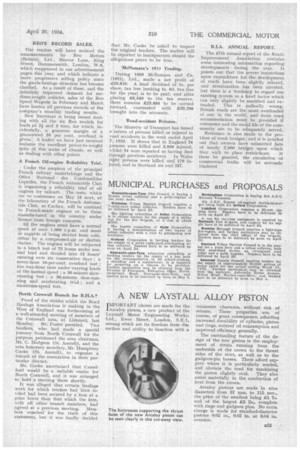WHEELS of INDUSTRY "The wheels of wealth will be slowed
Page 34

Page 35

Page 36

Page 37

If you've noticed an error in this article please click here to report it so we can fix it.
by all difficulties of transport, at whatever points arising, as a carriage is by the roughness of the roads over which it runs."—John Beattie Crozier.
VACANCY ON "CM." EDITORIAL STAFF.
A position is available on the editorial staff of this journal. The qualifications required are sound technical knowledge of commercial-vehicle design, operation and maintenance, preferably on both the goods and passenger sides, a good standard of education and the ability to write clearly and concisely on all matters pertaining to the industry.
Applicants must be capable of conducting searching road tests on all classes of commercial vehicle, must not be more than 35 years of age, and not afraid of hard work. Applications should be addressed to the Manager, The Commercial Motor, 5-15, Rosebery Avenue, London, E.C.1.
Air Transport Progress.
Last week we announced that Temple Press Ltd., the proprietors of The Commercial Motor, had acquired The
Aeroplane. As the field of aviation will, therefore, be very adequately covered by our associated journal, the publication of our monthly Air Trans'port Supplement will be discontinued. Progress in aviation will, however, be recorded, particularly where services are operated by road-transport concerns or where there is a linking-up of road and air services ; also, attention will be given from time to time to especially interesting examples of commercial aircraft. We shall continue to give news items on aviation matters.
The Aeroplane is published each Thursday.
Death of Mr. E. C. Marston.
It is with deep regret that we have to record the death of Mr. Ernest Charles Marston, M.Inst.T., founder and president of the Road Haulage Association, who passed away on Sunday last at Holmlie Nursing Home, Birmingham, six weeks after a severe operation. The funeral took place on Wednesday at Longmore Lane Cemetery, Fazakerley.
Mr. Marston was born on June 22, 1890, and was articled to the architectural profession. He then entered the shipping and insurance business and became managing director of a large insurance company, but since 1918 his activities had been devoted to the development of road transport, and he became chairman of MRS., Ltd. He was one of the few men that could be alluded to as having a dynamic personality.
He was one of the leading men of the haulage industry who, on April 29, 1930, attended The Commercial Motor luncheon at which the Long Distance Road Haulage Committee was formed, which later was merged into the R.H.A.
B20 IMPORT AND EXPORT RETURNS FOR MARCH.
According to the Board of Trade returns for March, the value of imports of commercial vehicles, cars, chassis and accessories was £286,997, as contrasted with 2218,711 and 2383,243 for 1933 and 1932 respectively. The value of chassis imported was 221,031, which compares with 218,483 for February of this year and 226,985 for March, 1933.
The number of complete commercial vehicles exported during the month was 254, of a value of 258,159, the returns for March, 1933, being 121 vehicles (233,885), and for March, 1932, 117 (£36,149). During the month 692 commercial chassis were exported as compared with 541 in March, 1933, and 729 the year before, their values being 298,851, 263,806 and 2119,881. Although the exports of complete commercial vehicles were higher in March than in February (254 against 216), the figures for chassis fell from 892 to 692.
A Gas-fuelled Leyland.
During the past few months Leyland Motors, Ltd., has been working in close co-operation with some of the authorities interested in the use of coalgas as fuel, and, in conjunction with them, has produced vehicles in which gas can be employed as an alternative source of power.
A vehicle of this type, recently delivered, has been built to the order of H. Briggs, Son and Co., Ltd., for use
-at its • Whitwood Colliery. It is a Beaver lorry and, when complete with its gas equipment„ is capable of dealing with a pay-load of si tons. The chassis differs very little from the standard petrol vehicle—in fact, with the exception of the addition of the gas equipment, the only alteration is the fitting of special pistons which slightly increase the compression ratio.
The gas equipment consists of six containers, a master stop valve, a double-reducing valve, a mixing valve and the necessary piping. The gas is stored at a pressere of 3,000 lb. per sq. in. The total weight of the vehicle is 5 tons 12 cwt.
Sternol's Profit.
A net profit of 24,636 was made by Sternol, Ltd., during 1933, as against 210,483 in 1932. Adding 2710 incometax reserve written back and £2,411 brought in, a total of 2.7,757 is available. In July last, a dividend of 4 per cent, was paid on the preferred ordinary shares in respect of arrears to June 30, 1931, and this accounts for 26,000. No further dividend is proposed, and the carry-forward is thus R1,757.
ALBION REPORT FOR 1933.
The report of Albion Motors, Ltd., for the year 1933 shows a trading loss, after making provision for depreciation, of £6,463, which reduces the credit balance to £3,560. A stun of £15,000 has been transferred from the reserve fund, reducing it to £205,000. A dividend on the preference shares at the rate of 6 per cent, per annum (less tax) absorbs £8,032, leaving £10,528 to be carried forward. No dividend is recommended for payment on the ordinary shares.
India's Imports Doubled.
The recent improvement in the demand for commercial vehicles in India is being well maintained. During December last 387 vans, lorries, buses and chassis were imported, bringing up the total for the nine months from April to December, 1933, to 3,609 vehicles, valued at £343,932, as compared with 1,820 and. £219,333 respectively a year earlier..
Of the total, 2,233 vehicles are credited to the United States, 849 to Canada, 495 to Great Britain and 32 to other countries. Although the British vehicles total only about onefifth of the American quota as regards numbers, they were equal to half the value of those from the United States.
A -Triple-purpose Cattle Carrier.
'We publish•on this page a picture of Commer Centaur 2-ton cattle truck, which is unique in that it incorporates a triple-purpose body. It can be employed for carrying two decks of sheep, for which purpose a separate loading ramp is used. This has collapsible guard rails, and when not in use is housed below the chassis frame in a specially constructed container. Each deck is divided by movable gates into three compartments, so that various grades of animals can be kept separate.•
When not in use as a small livestock carrier, the centre platform, together with the gates, can be reMoved, and the vehicle is then suitable for carrying beasts of a.larger size. The tailboard is divided into two sections and, as it is adequately supported to carry the weight, can be used as a ramp when
lOading and unloading larger cattle. . The other purpose for which the vehicle is intended is that of carrying carcasses of meat, these being hung from iron rails in the roof. It will be appreciated that the body has to be of very solid construction, owing to the fact that two tons of meat can be suspended approximately 10 ft. from the ground.
When the vehicle is used for this purpOse the whole of the interior fitments 'required for cattle carrying are removed. The body of this interesting vehicle was built by Rootes, Ltd., Len Engineering Works, Maidstone.
Fewer Road Accidents in the City of London.
In his annual report. Sir Hugh Turnbull, Commissioner of City Police, shows that the number of persons killed and injured in street accidents in he City of Londonduring 1933 was,
with one exception, the lowest recorded for the past 10 years. This is especially satisfactory when it is borne in mind that a 1933 census of vehicular traffic showed an increase of 16.58 per cent. over the figure for 1924. During 1933 there were 680 street accidents in Which 17 persens were killed and 710 injured, the comparable figures for 1932 being 717 street accidents, 17 persons killed and 739 persons injured. PERSONAL PARS.
M. Ountanois, of the French Office National des Combustibles Liquides, who has lately been appointed a Commander of the French Legion of Honour, is a, leading French authority on oil engines. He has also done considerable research work in connection with anti-knock fuels, and mixtures of alcohol and benzole for petrol engines. He runs a school in Paris for internalcombustion-engine students.
At the annual meeting of the Newcastle-on-Tyne section of the Institute of Transport, Mr. J. Petrie was reelected chairman, and Messrs. H. P. Currie, W. F. Endean and H. J. Moscrip were elected vice-chairmen.
Mr. Petrie is general manager of the Northern General Transport Co., Ltd. He began business life with the Birmingham and Midland Motor Omnibus Co., Ltd., and was eventually appointed chief assistant engineer. Later, he was appointed to the managership of the Sociedad General de Autobuses de Madrid, and some time afterwards became manager of the China General Omnibus Co., Shanghai. He has been with the "Northern General " for eight years.
Special interest attaches to the election of Mr. Wilfred E. Gooday, chief of the industrial technical department of the Vacuum Oil Co., Ltd., to the council of the Institution of Petroleum Technologists, as he is the first original student to obtain membership of the council. He joined the Institution as a student in 1914 and has passed through all its various grades.
During the war Mr. Goodiy was a sub-section director in charge of fuels and lubricants in the Aircraft Production Department, and in 1918 he was a member of the interAllied Petroleum Commission to the United States. After the war he joined the Vacuum concern and became manager of its technical department.
The appointment of Mr. Paul Stanley to be director and general manager of a company specializing in the sale of tyres of the leading makes has recently' been announced by Simmons, Lotinga and Deen, Ltd., which is the proprietor of The Tower, an attractive service station on the Watford By-pass.
Mr. Stanley has had an extensive experience in the tyre business. Commencing in the Goodyear factory, he was 'successively in charge of the tyre room and inspection division, and manager of the technical service side of the development department. .Later he was appoirited assistant production manager. afterwards becoming sales supervisor in the southern division. 1-Es headquarters are now at Tower Tyres, Ltd., 617, Finchley Road, London, N.W.3.
SPECTACULAR ADVANCE OF THE OILER ANTICIPATED.
A prophecy that, in the near future, spectacular progress will be made throughout the world by the oil engine was made by Dr. A. E. Dunstan, director of research of the Anglo-Persian Oil Co., Ltd., when speaking on " Some Recent Developments in the Field of Petroleum," before the Nottingham Section of the Society of Chemical Industry, on April 12. He forecast that the usual power unit for lorries and buses would be the oiler.
" Further than this," he said, " opinion is hardening in the direction of the compression-ignition engine for all civil-aviation purposes.
"In April, 1928," went on Dr, Dunstan, "two oil-engined lorries were imported into England. In 1933 there were about 3,000 in use, and the great bulk of these had home-produced prime-movers. France and Germany have made corresponding progress."
Unfair Police Methods in "Trapping" Complaint that unfair methods are, at times, used by motor police with the object of securing convictions against road-transport operators was made at a meeting held under the auspices of the Commercial Motor Users Association at Dewsbury last Friday.
An operator said that one of his employees had alleged that, on a recent night, he had seena police motor patrol, without lights, following a lorry, the driver of which was later
charged with speeding. • Mr. James France, president of the C.M.U.A., stated that many similar complaints had been brought to his notice. He promised that when. any operator in Yorkshire—whether a member of the C.M.U.A. or not— brought him a concrete case in which complaint, accompanied by details, was made of unfair methods by the police, he would take the matter to the proper authorities.
Mr. Stirk Holds the First Traffic Court.
Although in our issue for last week we intimated that the first Traffic Court in Great Britain, under the Road and Rail Traffic Act, 1933, was held at Nottingham by Mr. J. H. Stirk, JP., M.Inst.T., Traffic Commissioner for the East Midland area, we had closed for press before the proceedings of the day were completed. The Court was officially. welcomed by the Lord Mayor of Nottingham, Alderman J. Farr. J.P., and those who associated themselves, on behalf of their organizations, with the welcome included Mr. W. Donaldson Wright (R.H.A.), Mr. L. W. A. White (legal profession), Mr. Almack (L.M.S. Railway), and Mr. 'Dobbs (C.M.U,A.).
In returning thanks, Mr. Stirk referred to the purpose of the new Act and to its enforcement of the legal requirements with regard. to hours, speeds, weights and, . in particular, maintenance of vehicles. He was sorry to say that, the examiners* reports on the first batch of applications were not too favourable. The first application to be heard was for a claimed-tonnage B licence, by Mr. W. J. Down, a Nottingham haulier. There was no opposition and his licence was granted.
Mr. G. Woodward dealt with the policy of the railway companies and said that it would be considerably influenced by the attitude now adopted by the road-transport industry.
Explaining Oil-engine • Advantages.
In an address to the Stockport Rotary Club, on Wednesday last, Mr. R. Wood Whittle (of Fodens, Ltd.) dealt thoroughly with the subject of oil-engined vehicles.
Crossleys for India Office.
Crossley Motors, Ltd., Gorton, Manchester, has received an order from the India Office for eight six-wheeled chassis of the 30-70 h.h.p. forwardcontrol type. FORD MOTOR CO.'S GOOD YEAR OF TRADING.
The report of the Ford Motor Co., Ltd., for 1933 shows a trading profit of £943,070 (including transfer fees, etc., of £560) as contrasted with a loss
of 281,366 a year earlier. Furthermore, there was a substantial profit on exchange, this amounting to 2443,649, as against a loss of £106,828 in 1932. The total profit was thus £1,386,719.
From this sum depreciation and obsolescence totalling 2526,091, directors' fees, interest on employees' investments and boys' training school of £9,742 have to be deducted, as well as interest on loans (£62,312) and other items totalling £95,092. These reduce the total to £755,795, and an appropriation for income tax further reduces it to £742,216, which enables the debit balance brought forward to be extinguished, and a credit balance of 2388,170 to be carried forward. REO'S RECORD SALES.
Our readers will have noticed the announcements by Reo Motors (Britain), Ltd., Beavor Lane, Ring Street, Hammersmith, London, W.6, which reappeared in our advertisement pages this year, and which indicate a more progressive selling policy since the goods-haulage situation has become clarified. As a result of these, and the definitely improved demand for medium-weight vehicles, sales of the Reo Speed Wagons in February and March have beaten all previous records of the company's monthly trading results.• New literature is being issued dealing with all the six Reo models for loads of 2i and 3 tons, for which, incidentally; a generous margin of a guaranteed 50 per cent, overload is given. A leaflet we have just received features the excellent power-to-weight ratio of this make of chassis, as well as dealing with other points.
A French Oil-engine Reliability Trial.
Under the auspices of the principal French railway undertakings and the Office National des Combustibles Liquicles, the French Automobile Club is organizing a reliability trial of oil engines for railcars. The tests, which are to commence on May 15 next, at the laboratory of the French Automobile Club, at Cachan, will be confined to French-made engines or to those manufactured in the country under licence from foreign concerns.
All the engines must have a normal speed of over 1,000 r.p.m. and must oe capable of being started from cold, either by a compressed-air or electric ttarter. The engines will be subjected to a bench test of 72 hours under normal load and divided into 12 hours' running over six consecutive days ; a seven-hour 10-per-cent, overload test ; five two-hour runs under varying loads at the normal speed ; a 30-minute slowrunning test ; a 30-minute slow-running and accelerating trial ; and a maximum-speed test.
North Cornwall Branch for R.H.A.?
Proof of the strides which the Road flaulage Association is making in the West of England was forthcoming at a well-attended meeting of members of the Cornwall area, at Liskeard, last Monday. Mr. Foster presided. Two hauliers, who had made a special journey from North Cornwall for the purpose, petitioned the area chairman, Mr. C. Hodgson (St. Austell), and the area honorary secretary, Mr. Humphrey Cooke (St. Austell), to organize a branch of the association in their particular district.
Mr. Cooke ascertained that Camelford would be a suitable centre for North Cornwall, and it was arranged to hold a meeting there shortly.
It was alleged that certain haulage work for which tenders had been invited had been secured by a firm at a price lower than that which the firm, with all other branch members, had agreed at a previous meeting. Members vouched for the truth of this statement, but it was finally decided that Mr. Cooke be asked to inspect the original tenders. The matter will be reported to headquarters should the allegations prove to he true.
'McNamara's 1933 Trading.
During 1933 McNamara and Co. (1921), Ltd., made a net profit of £29,816. A final dividend of Is. per share, tax free (making is. 6d. tax free for the year) is to be paid, and after placing £6,540 to the tax reserve, there remains £23,656 to be carried forward, contrasted with £20,298 brought into the accounts.
Road-accident Returns.
The Ministry of Transport has issued a ',return of persons killed or injured in rnad accidents in the week ended April 1934. It shows that in England 76 persons were killed and 3,509 injured, whilst 34 were reported as having died through previous accidents. In Wales eight persons were killed and 179 injured, and in Scotland six and 347. R.LA. ANNUAL REPORT.
The 47th annual report of the Road: Improvement Association contains some interesting information regarding developments daring the year. It points out that the severe restrictions upon expenditure for the development of roads have been slightly relaxed, and deterioration has been arrested. but there is a tendency to regard our existing system as a fixed factor which can only slightly be modified and extended. This is radically wrong. British roads are the most overloaded of any in the world, and more road accommodation must be provided if commerce and the social life of the community are to be adequately served.
Reference is also made to the problem of weak bridges, and it is pointed out that owners have submitted lists of nearly 2,000 bridges upon which they wirh to place restrictions. It these be granted, the circulation of commercial traffic will be seriously hindered




























































































